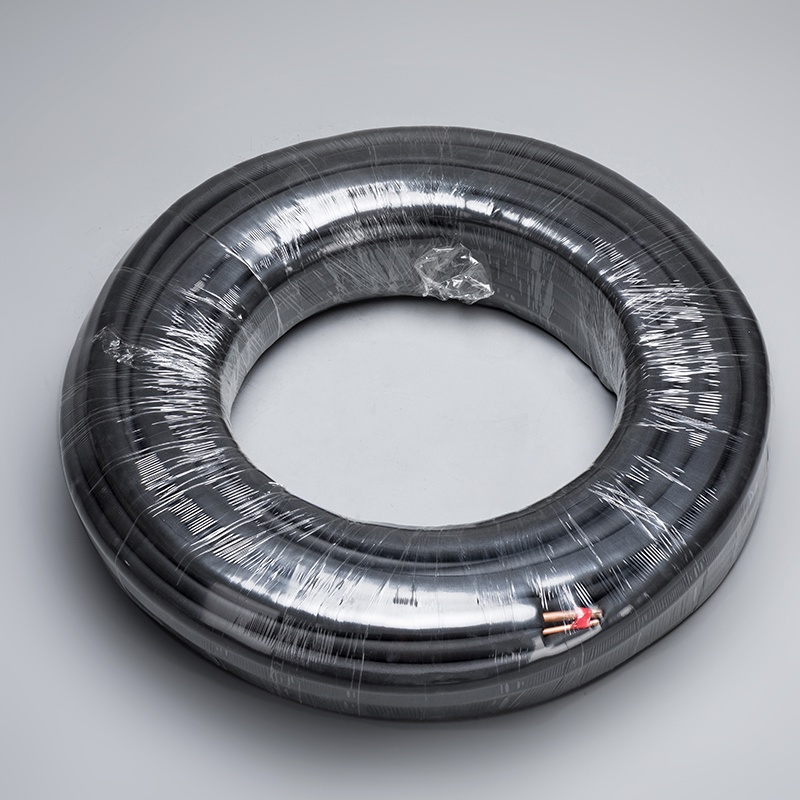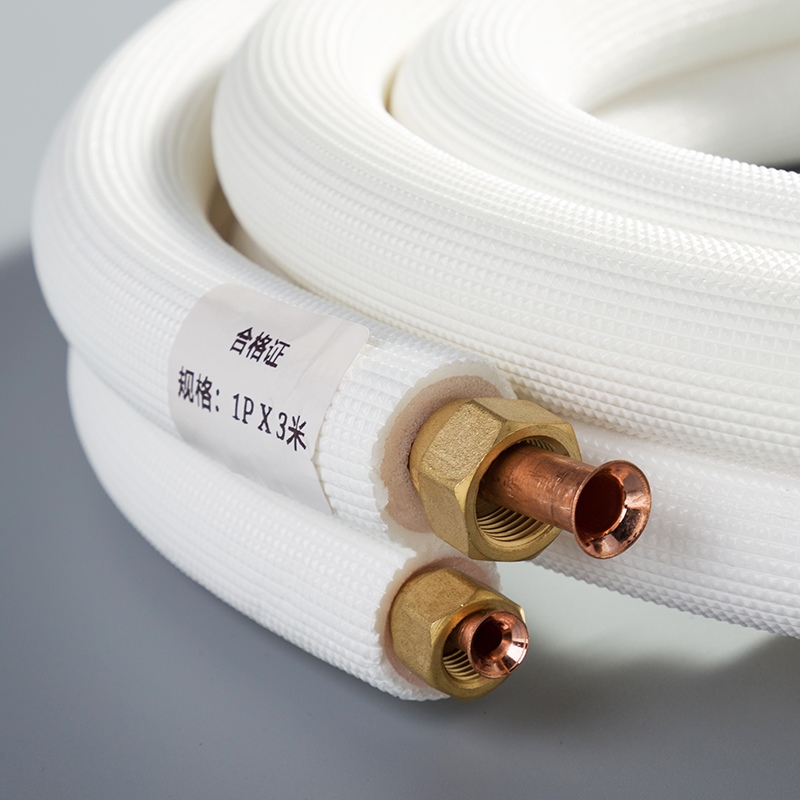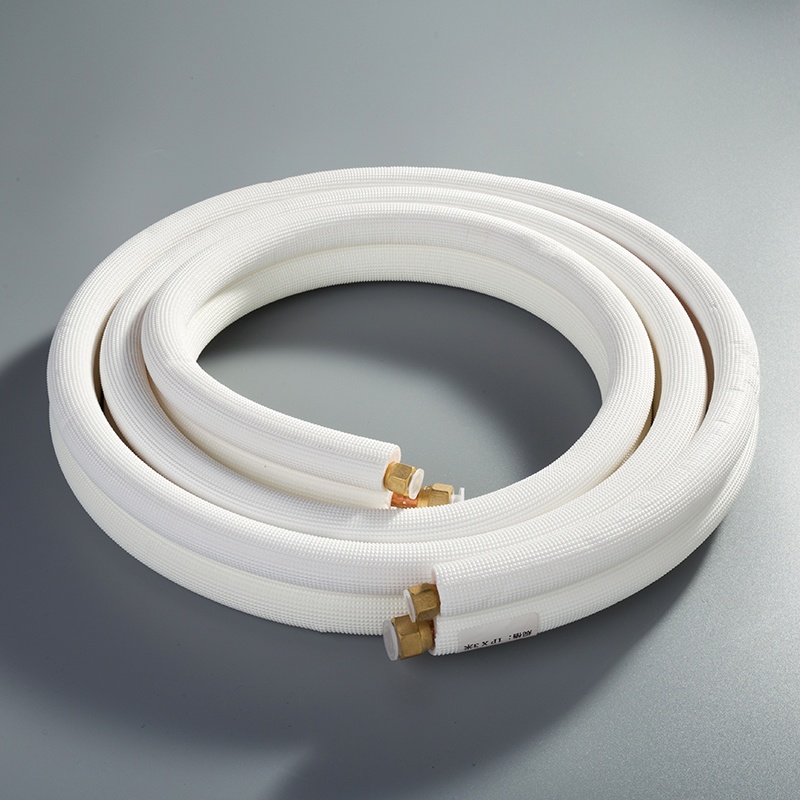Understanding Why Your AC Copper Pipe Feels Hot

When you touch the copper pipe in your air conditioner and it feels hot, you might wonder what's going on. This isn't just a minor inconvenience; it could signal issues like low refrigerant levels or a malfunctioning compressor. These problems can affect the efficiency of your cooling system. Understanding why your air conditioner copper pipe gets hot helps you address potential issues before they escalate. With the air-conditioning copper pipe market expected to grow significantly, knowing the appropriate copper pipe size for air conditioners becomes even more crucial for optimal performance.
Common Causes of a Hot Copper Pipe

When your air conditioner copper pipe feels hot, it often points to underlying issues. Let's explore some common causes and how they affect your system.
Low Refrigerant Levels
Low refrigerant levels can make your air conditioner copper pipe hot. Refrigerant plays a crucial role in cooling your home by absorbing heat from the indoor air and releasing it outside. When the refrigerant level drops, the system struggles to remove heat effectively.
Signs of Low Refrigerant
You might notice several signs indicating low refrigerant levels. The air conditioner may not cool as efficiently, and you might hear a hissing sound near the copper pipes. Additionally, the system might run longer than usual, trying to maintain the desired temperature.
How Low Refrigerant Causes Heat
Low refrigerant levels cause the compressor to work harder, leading to increased pressure and heat in the copper pipes. This extra strain can make the air conditioner copper pipe hot to the touch. Over time, this can damage the compressor and other components, reducing the system's lifespan.
Malfunctioning Compressor
The compressor is the heart of your air conditioning system. It circulates the refrigerant through the system, enabling the cooling process. A malfunctioning compressor can lead to a hot copper pipe.
Symptoms of Compressor Issues
If the compressor isn't working correctly, you might hear unusual noises like clattering or buzzing. The air conditioner might also cycle on and off frequently, or it might not start at all. These symptoms suggest that the compressor needs attention.
Impact on Copper Pipe Temperature
A faulty compressor can cause the refrigerant to circulate improperly, leading to uneven pressure and temperature in the copper pipes. This can result in the air conditioner copper pipe hot, affecting the system's overall performance.
Airflow Obstructions
Proper airflow is essential for your air conditioning system to function efficiently. Blockages can lead to a hot copper pipe and reduced cooling capacity.
Identifying Blockages
Check for blockages in the air filters, vents, and ducts. Dirty or clogged filters restrict airflow, forcing the system to work harder. You might also find debris or obstructions in the outdoor unit, which can impede airflow.
Effects on System Performance
When airflow is restricted, the system can't dissipate heat effectively. This can cause the copper pipe size for air conditioner systems to become hot, as the heat isn't being released properly. Regular maintenance, such as cleaning filters and ensuring clear vents, can prevent these issues.
Scientific Research Findings: Regular maintenance of AC copper pipe fittings is essential to prevent refrigerant flow hindrance and reduce system efficiency. Proper maintenance ensures fittings remain in good condition, reducing the risk of breakdowns.
Understanding these common causes helps you address issues promptly, ensuring your air conditioner runs smoothly. Keeping an eye on the copper pipe size for air conditioner systems and maintaining them regularly can prevent many problems.
Troubleshooting the Issue
When your air conditioner copper pipe feels hot, it's time to roll up your sleeves and troubleshoot. Let's dive into some practical steps you can take to identify and resolve the issue.
Checking Refrigerant Levels
Low refrigerant levels often cause the air conditioner copper pipe to become hot. Here's how you can check the refrigerant levels yourself.
Tools Needed for Checking
Before you start, gather the necessary tools:
Refrigerant gauge set: This tool helps you measure the pressure of the refrigerant in your system.
Thermometer: Use this to check the temperature of the copper pipes.
Safety gloves and goggles: Protect yourself while handling refrigerant.
Steps to Measure Refrigerant
Turn off the AC unit: Ensure safety by switching off the power.
Connect the gauge: Attach the refrigerant gauge to the service port on the AC unit.
Read the pressure: Check the pressure reading on the gauge. Compare it with the recommended levels in your AC manual.
Check the temperature: Use the thermometer to measure the temperature of the copper pipe. If the air conditioner copper pipe is hot, it might indicate low refrigerant.
If you find the refrigerant levels are low, consider calling a professional to recharge the system safely.
Inspecting the Compressor
The compressor plays a vital role in your AC system. A malfunctioning compressor can lead to a hot copper pipe. Here's how you can inspect it.
Visual Inspection Tips
Look for leaks: Check around the compressor for any signs of oil or refrigerant leaks.
Inspect the wiring: Ensure all electrical connections are secure and free from corrosion.
Check for damage: Look for any visible damage or wear on the compressor.
Listening for Unusual Noises
Turn on the AC: Listen for any unusual noises like clattering or buzzing.
Identify the source: If you hear strange sounds, they might indicate a problem with the compressor.
Regular maintenance, such as keeping the coils and filters clean, can prevent compressor issues.
Ensuring Proper Airflow
Proper airflow is crucial for your AC system's efficiency. Blockages can cause the air conditioner copper pipe to get hot. Here's how to ensure proper airflow.
Cleaning Air Filters
Remove the filter: Take out the air filter from the AC unit.
Clean or replace: If it's reusable, wash it with water and let it dry. If not, replace it with a new one.
Reinstall the filter: Place the clean or new filter back into the unit.
Checking for Duct Blockages
Inspect the ducts: Look for any visible blockages or debris in the ducts.
Clear obstructions: Remove any debris or objects blocking the airflow.
Regularly cleaning air filters and checking for duct blockages can prevent the air conditioner copper pipe from becoming hot. Keeping an eye on the copper pipe size for air conditioner systems ensures optimal performance.
When to Seek Professional Help
Sometimes, despite your best efforts, the air conditioner copper pipe hot issue persists. This can be frustrating, but knowing when to call in a professional can save you time and prevent further damage.
Persistent Issues Despite Troubleshooting
You've tried everything—checked the refrigerant levels, inspected the compressor, and ensured proper airflow. Yet, the problem remains. This is a clear sign that it's time to seek professional help.
Recognizing When DIY Isn't Enough
You might wonder, "When should I stop trying to fix this myself?" If you've followed all the troubleshooting steps and the air conditioner copper pipe still feels hot, it's a good idea to call a professional. They have the expertise and tools to diagnose and fix complex issues that might not be apparent to you.
Expert Testimony: According to Professional Service Technician, "When your air conditioner needs more than regular maintenance, such as when it does not reduce the indoor temperature to a comfortable level, hire a professional service technician."
Safety Concerns
Handling air conditioning issues involves certain risks, especially when dealing with refrigerants and electrical components. Safety should always be your top priority.
Handling Refrigerant Safely
Refrigerants are crucial for your AC's cooling process, but they can be hazardous if not handled properly. Professionals know how to manage refrigerants safely, ensuring no harm comes to you or your system. Attempting to recharge or repair refrigerant lines without proper training can lead to leaks or exposure to harmful chemicals.
Risks of Ignoring the Problem
Ignoring a hot copper pipe can lead to bigger problems down the line. A malfunctioning system can cause increased energy bills, reduced cooling efficiency, and even complete system failure. By addressing the issue promptly with professional help, you can avoid these risks and ensure your air conditioner runs smoothly.
Preventive Measures for Future Issues

Taking preventive measures can save you from the hassle of dealing with a hot copper pipe in your air conditioner. By following some simple maintenance tips and monitoring your system's performance, you can ensure your AC runs smoothly and efficiently.
Regular maintenance tips
Regular maintenance is key to preventing issues with air conditioner. It helps keep the system in top shape and extends its lifespan.
Scheduling Professional Inspections
You should schedule professional inspections at least once a year. A qualified technician can spot potential problems before they become major issues. They will check the refrigerant levels, inspect the compressor, and ensure the airflow is unobstructed. Bob McCollum, who had an American Standard split-system installed, shared, "The systems have been working well, as promised, and I’m very pleased with the efficiency and quality of the entire operation." This highlights the importance of professional maintenance for optimal performance.
DIY Maintenance Practices
While professional inspections are crucial, you can also perform some maintenance tasks yourself. Regularly clean or replace air filters to ensure proper airflow. Check the copper pipe size for air conditioner systems to make sure they are not exposed to direct sunlight, which can cause them to heat up. Keep the outdoor unit free from debris and ensure the vents are clear. These simple steps can prevent the air conditioner copper pipe from getting hot.
Monitoring System Performance
Keeping an eye on your AC's performance helps you catch issues early. By monitoring temperature changes and using smart technology, you can maintain a comfortable home environment.
Keeping an Eye on Temperature Changes
Pay attention to any unusual temperature changes in your home. If the air conditioner copper pipe feels hot, it might indicate a problem. Regularly check the temperature of the copper pipes and compare it with the normal operating range. This proactive approach can help you address issues before they escalate.
Using Smart Thermostats
Smart thermostats offer a convenient way to monitor and control your AC system. They provide real-time data on your system's performance and alert you to any anomalies. By using a smart thermostat, you can optimize your AC's efficiency and prevent the air conditioner copper pipe from becoming hot. A customer of Precise AC praised their service, saying, "They arrived when promised, and, most importantly, they EXPLAINED what they were doing and why they were doing it." This level of transparency and expertise can be mirrored by using smart technology to understand your system better.
By following these preventive measures, you can keep your air conditioner running smoothly and avoid the inconvenience of a hot copper pipe. Regular maintenance and monitoring ensure that your system remains efficient and reliable.
Understanding Your AC System Better
To truly grasp why your air conditioner copper pipe might feel hot, you need to understand the basic components of your AC system. Each part plays a vital role in keeping your home cool and comfortable.
Basic Components of an AC System
Your air conditioning system consists of several key components that work together to cool your home efficiently.
Role of the Copper Pipe
Copper pipes are essential in your AC system. They transport refrigerant between the indoor and outdoor units. This movement allows the refrigerant to absorb heat from inside your home and release it outside. Copper's high thermal conductivity makes it an ideal choice for this task. It ensures efficient heat transfer, which is crucial for maintaining a comfortable indoor temperature. Regular maintenance of these pipes prevents dirt buildup and leaks, ensuring they function optimally.
How the System Cools Your Home
Your AC system cools your home by using the refrigerant to absorb heat from the indoor air. The refrigerant travels through the copper pipes, carrying the heat to the outdoor unit. There, the heat dissipates into the outside air. This cycle repeats until your home reaches the desired temperature. If the copper pipe size for air conditioner systems is incorrect, it can affect the efficiency of this process, leading to issues like the air conditioner copper pipe hot.
Importance of Each Component
Each component in your AC system plays a specific role. Understanding their importance helps you maintain your system better.
How Each Part Affects Efficiency
Every part of your AC system contributes to its overall efficiency. The compressor circulates the refrigerant, while the evaporator coil absorbs heat. The condenser coil releases the absorbed heat outside. Copper pipes connect these components, ensuring smooth refrigerant flow. If any part malfunctions, it can reduce the system's efficiency. For instance, a clogged filter restricts airflow, forcing the system to work harder and potentially causing the air conditioner copper pipe to become hot.
Signs of Component Failure
Recognizing signs of component failure can help you address issues before they escalate. Unusual noises, reduced cooling efficiency, and increased energy bills are common indicators. If the air conditioner copper pipe feels hot, it might signal a problem with the refrigerant flow or compressor. Regular inspections and maintenance can help you catch these issues early, ensuring your system runs smoothly.
Scientific Research Findings: Copper tubes offer high heat transfer capacity in a compact space, contributing to energy efficiency in appliances and equipment. This makes copper a sustainable choice for heating and cooling applications.
By understanding your AC system better, you can ensure it operates efficiently and avoid common issues like a hot copper pipe. Regular maintenance and monitoring of each component's performance are key to keeping your home comfortable.
Addressing a hot copper pipe promptly can save you from bigger headaches down the road. Regular maintenance is your best friend in keeping your air conditioner running smoothly. By cleaning and inspecting your system, you prevent dirt and debris from clogging the copper pipe fittings. This ensures the refrigerant flows freely, maintaining efficiency. If you notice persistent issues or feel unsure, don't hesitate to consult a professional. They can provide expert advice and ensure your system operates at its best. Remember, the right copper pipe size for air conditioner systems plays a crucial role in preventing the air conditioner copper pipe hot issue.
See Also
The Benefits of Selecting Copper Pipes for AC Systems
Explore the Advantages of Copper Pipes in Air Conditioning
The Importance of Copper Pipes for Optimal AC Efficiency


